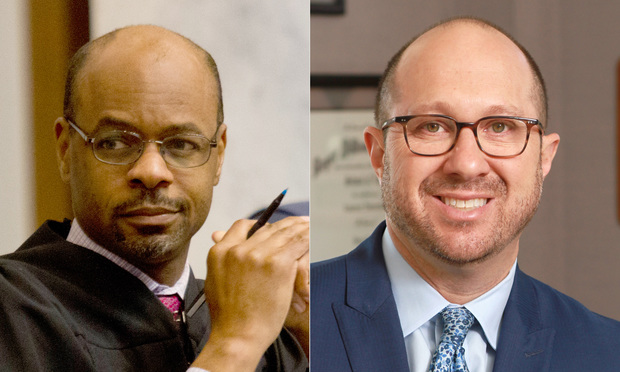The Judicial Council of Georgia is planning to propose legislation next year that could alter the state’s speedy trial statute, the Supreme Court of Georgia’s chief justice said.
Possible changes to the statute would likely be included as part of a broader proposal authorizing the extension of judicial emergency orders beyond the governor’s declared emergencies, said Chief Justice Harold Melton.
The legislation is needed to address a growing backlog of unresolved cases since March when all but essential court operations, including grand juries and jury trials, were suspended as COVID-19 began spreading through Georgia, the chief justice said.
Melton’s Sept. 10 judicial emergency order—his seventh since March—lifted the suspension on grand juries. Melton said he intends to re-inaugurate in-person jury trials in a new order next month.
Draft guidelines for restarting jury trials currently circulating in the state’s judiciary branch would require the courts to adhere to public health and safety guidelines to limit the spread of COVID-19. But those proposed guidelines have generated parallel concerns about “the realistic capacity of the courts to work down those backlogs in the face of statutory speedy trial demands” that could require a legislative remedy, Melton said.
The draft jury resumption guidelines recommend continuing the suspension of statutory deadlines associated with indictments and jury trials because they “will not occur at the scale or with the speed they occurred before the pandemic.”
Melton said Tuesday it would be “premature” to talk about the details of proposed legislation involving speedy trials.
“I don’t want to make the case for it just yet,” he said. “I want to have ability to look at issues to figure out what the solutions might be, and then go forward with whatever conversations are necessary.”
“Overall, we have to look at what the backlog might be, what would be the capacity to work down that backlog in a timely fashion,” he added.
The chief justice also acknowledged the continuing suspension of speedy trial deadlines have both statutory and constitutional implications. But, he said that for now, “It’s not anything I would want to talk about out loud.”
“We have a judicial council legislative committee, where we try to facilitate all legislation impacting the judiciary,” he added. “We have a formalized process for how we approve legislation that the judicial council is backing,” he said.
Fulton County Superior Court Judge Shawn LaGrua, chair of the chief justice’s Judicial COVID-19 Task Force, will likely be involved in that process. She told the Judicial Council on Monday that her committee is “taking a look at some legislation that would help with COVID” that would be introduced in the Georgia General Assembly early next year.
LaGrua later declined to elaborate, saying they were “just getting started” and “haven’t even had a preliminary meeting.”
In Georgia, once a defendant files a speedy trial motion, a jury must be impaneled and qualified to try that defendant within two court terms. Otherwise, the defendant will be acquitted of the pending criminal charges. Court term lengths vary from two to six months across the state.
Melton’s emergency orders since March repeatedly have suspended speedy trial deadlines for jury trials. That suspension remained in place in his Sept. 10 emergency order, even though he allowed the resumption of grand juries.
Lawrence Zimmerman, president of the Georgia Association of Criminal Defense Lawyers and GACDL executive director Jill Travis said this week his organization has gotten no details on any proposal to alter the speedy trial statute.
“We would absolutely want to see what it is they are proposing to change and very likely would have concerns,” Travis said.
Zimmerman said the question of how to resume trials safely if too many defense lawyers file speedy trial motions “has been an obvious question from Day One. … “It’s going to be a balancing act.”
Zimmerman said he has heard from some criminal defense lawyers that they intend to file speedy trial demands as soon as jury trials resume. “I think there is a level of frustration from the criminal defense bar trying to move cases with certain prosecutors,” he said.
“Lawyers have got to do what’s in the best interest of your client. But be careful what you do,” he warned, “because they’re going to suspend the speedy trial statute in the interim.”
But, he added, the judiciary “can’t turn around and just say no to speedy trials.”
NOT FOR REPRINT
© 2024 ALM Global, LLC, All Rights Reserved. Request academic re-use from www.copyright.com. All other uses, submit a request to [email protected]. For more information visit Asset & Logo Licensing.


 Chief Justice Harold Melton of the Supreme Court of Georgia (left) and Lawrence Zimmerman. (Photos: John Disney/ALM and Courtesy)
Chief Justice Harold Melton of the Supreme Court of Georgia (left) and Lawrence Zimmerman. (Photos: John Disney/ALM and Courtesy)







